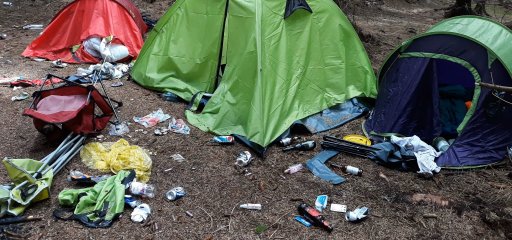
Pioneer I
- 11,171
- First Name
- Dave
- Last Name
- Spinks
- Member #
-
3057
- Service Branch
- Royal Navy Veteran
Let me begin by expressing my appreciation for iOverlander.
We've relied heavily on it during our travels, particularly outside of the UK and Europe, where finding spots for wild camping or parking isn't as challenging due to the more relaxed relationship between locals and travellers. Many times, especially when darkness crept in and we were in unfamiliar territory, iOverlander came to our rescue, providing a discreet and comfortable area to park.
However, there's a caveat.
In several instances, the locations weren't suitable for a roof tent, a fact that wasn't always clearly communicated in the description. While vans, self-contained campers, cars, and ground tents were accommodated, the unique needs of roof tents, which straddle the line between these styles, weren't always met, leading to some issues.
Adding to this, many of the locations I've come across in the UK haven't been visited in over five years. In reality, the UK has undergone significant changes, dealing with a pandemic, lockdowns, and Brexit. In Scotland, for example, the past two winters saw devastating storms that flattened vast stretches of forests and woodlands. So, can we really rely on iOverlander?
The short answer is no.
Take, for instance, a location an hour from Aberdeen described as tucked away up a forest track, out of sight. While accurate in the past, that forest has since been destroyed by the December 2022 storm, leaving behind nothing but a patch of land littered with debris, clearly visible from the road and nearby houses.
So, what's the solution? One option is to ditch iOverlander in favour of Park4Night, a platform that's more populated and frequently updated. However, it still doesn't fully cater to the needs of roof tent users, leaving us in a quandary.
My proposal is simple: leverage the vast network of Overland Bound members across the UK, Europe, and beyond. Why not tap into this resource by asking members to visit iOverlander locations near them? We could organise these visits into Rally Points, where members check the accuracy of the information on iOverlander and update our Overland Bound app accordingly, with details specifically tailored to roof tent users, who make up the majority of our membership.
This additional information could include whether the location is suitable for roof tents, specific details about how discrete it is, level of use, and cleanliness. Members could also take photos to provide others with a better understanding of the spot.
Moreover, if a location is found to be littered or poorly maintained, members could organise clean-up events or "Trail Guardian" initiatives to restore it. After all, arriving at a messy campsite after a long drive is far from ideal.
The benefits of this approach are numerous: a more up-to-date and usable network of locations for all members, less friction with local communities due to our discreet and responsible behaviour, and the proactive enhancement of our surroundings.
A natural progression from this would be for local members to adopt nearby locations. While adopting entire trails, as is done in the USA, might not be feasible in the UK, adopting individual spots and periodically visiting them for clean-ups and updates is certainly achievable.
I'm eager to hear your thoughts. Do you believe this is a worthwhile endeavour? Would you like to be part of it?
We've relied heavily on it during our travels, particularly outside of the UK and Europe, where finding spots for wild camping or parking isn't as challenging due to the more relaxed relationship between locals and travellers. Many times, especially when darkness crept in and we were in unfamiliar territory, iOverlander came to our rescue, providing a discreet and comfortable area to park.
However, there's a caveat.
In several instances, the locations weren't suitable for a roof tent, a fact that wasn't always clearly communicated in the description. While vans, self-contained campers, cars, and ground tents were accommodated, the unique needs of roof tents, which straddle the line between these styles, weren't always met, leading to some issues.
Adding to this, many of the locations I've come across in the UK haven't been visited in over five years. In reality, the UK has undergone significant changes, dealing with a pandemic, lockdowns, and Brexit. In Scotland, for example, the past two winters saw devastating storms that flattened vast stretches of forests and woodlands. So, can we really rely on iOverlander?
The short answer is no.
Take, for instance, a location an hour from Aberdeen described as tucked away up a forest track, out of sight. While accurate in the past, that forest has since been destroyed by the December 2022 storm, leaving behind nothing but a patch of land littered with debris, clearly visible from the road and nearby houses.
So, what's the solution? One option is to ditch iOverlander in favour of Park4Night, a platform that's more populated and frequently updated. However, it still doesn't fully cater to the needs of roof tent users, leaving us in a quandary.
My proposal is simple: leverage the vast network of Overland Bound members across the UK, Europe, and beyond. Why not tap into this resource by asking members to visit iOverlander locations near them? We could organise these visits into Rally Points, where members check the accuracy of the information on iOverlander and update our Overland Bound app accordingly, with details specifically tailored to roof tent users, who make up the majority of our membership.
This additional information could include whether the location is suitable for roof tents, specific details about how discrete it is, level of use, and cleanliness. Members could also take photos to provide others with a better understanding of the spot.
Moreover, if a location is found to be littered or poorly maintained, members could organise clean-up events or "Trail Guardian" initiatives to restore it. After all, arriving at a messy campsite after a long drive is far from ideal.
The benefits of this approach are numerous: a more up-to-date and usable network of locations for all members, less friction with local communities due to our discreet and responsible behaviour, and the proactive enhancement of our surroundings.
A natural progression from this would be for local members to adopt nearby locations. While adopting entire trails, as is done in the USA, might not be feasible in the UK, adopting individual spots and periodically visiting them for clean-ups and updates is certainly achievable.
I'm eager to hear your thoughts. Do you believe this is a worthwhile endeavour? Would you like to be part of it?
Attachments
-
581.1 KB Views: 71






